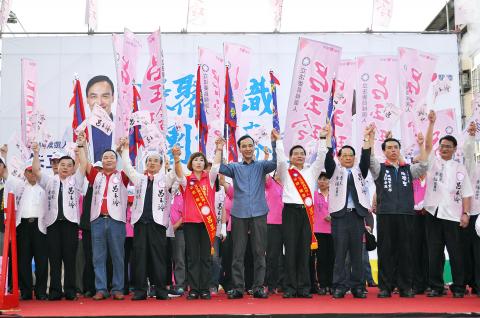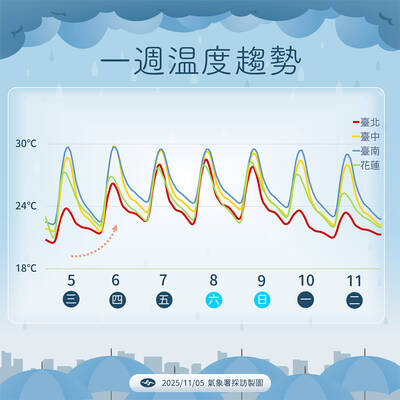Chinese Nationalist Party (KMT) Chairman and presidential candidate Eric Chu (朱立倫) yesterday released the party’s list of legislator-at-large nominees, saying the lineup demonstrated his efforts to allow more professionals and new faces to represent the KMT.
“More than half of the so-called ‘safe seats’ on the entire list are occupied by individuals with certain expertise and capabilities. Hopefully, this effort can give more specialists and upcoming talentsthe opportunity to represent the KMT in the legislature,” Chu said on the sidelines of a forum to promote his housing policy in Taipei yesterday morning, an hour before the KMT headquarters released the list.
Dismissing critics who lambasted the list, part of which was leaked on Thursday evening, as a continuation of the party’s patronage system, Chu said he would humbly accept all criticism against the list, but his determination to usher in reforms would remain unwavering.

Photo: Wang Han-ping, Taipei Times
The process of reform would undoubtedly be difficult and might even be filled with dangers, Chu said.
“Nevertheless, please have faith in my determination in implementing reforms. Changes might not come quickly, but I will do my utmost to fulfill the goal,” Chu said.
The KMT estimates it could garner sufficient votes in the Jan. 16 presidential and legislative elections to secure legislative seats for the first 12 people on the list of 34.
As widely predicted, the top spot is taken by Legislative Speaker Wang Jin-pyng (王金平), who has held the speakership for nearly 17 years, since February 1999.
The speaker is followed by Tamkang University dean of student affairs Ko Chih-en (柯志恩); Kaohsiung Medical University vice president Chen Yi-Ming (陳宜民); Taiwan New Immigrant Development and Exchange Association director-general Lin Li-chan (林麗蟬), who is a Cambodian immigrant spouse; TEDxTaipei cofounder Jason Hsu (許毓仁) and Financial Supervisory Commission Chairman William Tseng (曾銘宗).
Also on the “safe list” are — in order of ranking — KMT Legislator Huang Chao-shun (黃昭順); former Taoyuan County commissioner John Wu (吳志揚); former KMT legislator Chang Li-shan (張麗善), Hualien County Commissioner Fu Kun-chi’s (傅崑萁) wife, Hsu Chen-wei (徐榛蔚); Presidential Office Secretary-General Tseng Yung-chuan (曾永權) and KMT Legislator Alicia Wang (王育敏).
In an apparent attempt by the KMT to reach out to the younger generation, Chu’s campaign office spokesperson Hsu Chiao-hsin (徐巧芯), a 26-year-old graduate National Chengchi University’s postgraduate program in political science, is 17th on the list.
Three members of the KMT Youth Corp also made the list: 31-year-old Lee Cheng-hao (李正皓) at No. 31, 25-year-old Lin Chia-hsing (林家興) at No. 33; and 22-year-old Hsiao Ching-yan (蕭敬嚴) at No. 34.
The nominee lineup conforms to Chu’s previously announced plan to give the safe seats on the list to three groups of people: the future choice for legislative speakership, professionals in specific fields and the KMT’s reserved talents for the 2018 mayoral and commissioner race.
The list was sent to the KMT’s Central Standing Committee for review at yesterday’s meeting, during which dozens of committee members voiced their concerns about the selection of the nominees.
The party’s 211-seat Central Committee is due to vote on the 34 nominees today.
Those who receive disapproval from more than half of the committee members at today’s the meeting would see their nomination annulled.
KMT Culture and Communications Committee director-general Lin Yi-hua (林奕華), who 14th on the list, said the nominees would be required to sign two affidavits after their nomination was passed by the Central Committee.
“One of them asks the candidates to pledge support for legislative reforms, while the other requires them to join the 2018 mayoral and commissioner elections should they be called upon by party headquarters. Those who refuse to comply would be stripped of their party membership,” Lin said.

Three Taiwanese airlines have prohibited passengers from packing Bluetooth earbuds and their charger cases in checked luggage. EVA Air and Uni Air said that Bluetooth earbuds and charger cases are categorized as portable electronic devices, which should be switched off if they are placed in checked luggage based on international aviation safety regulations. They must not be in standby or sleep mode. However, as charging would continue when earbuds are placed in the charger cases, which would contravene international aviation regulations, their cases must be carried as hand luggage, they said. Tigerair Taiwan said that earbud charger cases are equipped

Foreign travelers entering Taiwan on a short layover via Taiwan Taoyuan International Airport are receiving NT$600 gift vouchers from yesterday, the Tourism Administration said, adding that it hopes the incentive would boost tourism consumption at the airport. The program, which allows travelers holding non-Taiwan passports who enter the country during a layover of up to 24 hours to claim a voucher, aims to promote attractions at the airport, the agency said in a statement on Friday. To participate, travelers must sign up on the campaign Web site, the agency said. They can then present their passport and boarding pass for their connecting international

UNILATERAL MOVES: Officials have raised concerns that Beijing could try to exert economic control over Kinmen in a key development plan next year The Civil Aviation Administration (CAA) yesterday said that China has so far failed to provide any information about a new airport expected to open next year that is less than 10km from a Taiwanese airport, raising flight safety concerns. Xiamen Xiangan International Airport is only about 3km at its closest point from the islands in Kinmen County — the scene of on-off fighting during the Cold War — and construction work can be seen and heard clearly from the Taiwan side. In a written statement sent to Reuters, the CAA said that airports close to each other need detailed advanced

UNKNOWN TRAJECTORY: The storm could move in four possible directions, with the fourth option considered the most threatening to Taiwan, meteorologist Lin De-en said A soon-to-be-formed tropical storm east of the Philippines could begin affecting Taiwan on Wednesday next week, the Central Weather Administration (CWA) said yesterday. The storm, to be named Fung-wong (鳳凰), is forecast to approach Taiwan on Tuesday next week and could begin affecting the weather in Taiwan on Wednesday, CWA forecaster Huang En-hung (黃恩鴻) said, adding that its impact might be amplified by the combined effect with the northeast monsoon. As of 2pm yesterday, the system’s center was 2,800km southeast of Oluanbi (鵝鑾鼻). It was moving northwest at 18kph. Meteorologist Lin De-en (林得恩) on Facebook yesterday wrote that the would-be storm is surrounded by